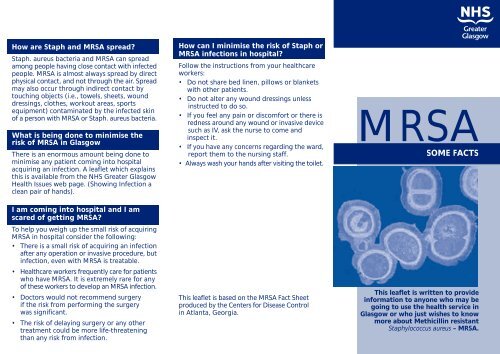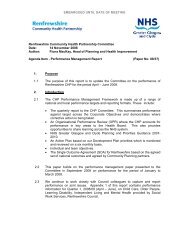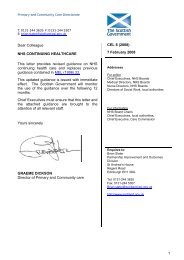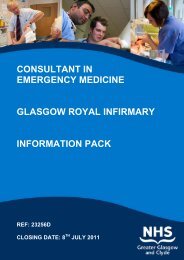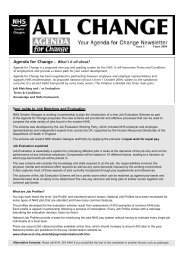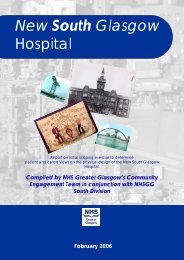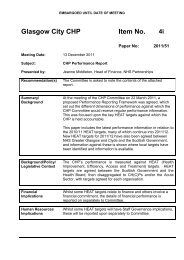MRSA - Some Facts - NHS Greater Glasgow and Clyde
MRSA - Some Facts - NHS Greater Glasgow and Clyde
MRSA - Some Facts - NHS Greater Glasgow and Clyde
You also want an ePaper? Increase the reach of your titles
YUMPU automatically turns print PDFs into web optimized ePapers that Google loves.
How are Staph <strong>and</strong> <strong>MRSA</strong> spread<br />
Staph. aureus bacteria <strong>and</strong> <strong>MRSA</strong> can spread<br />
among people having close contact with infected<br />
people. <strong>MRSA</strong> is almost always spread by direct<br />
physical contact, <strong>and</strong> not through the air. Spread<br />
may also occur through indirect contact by<br />
touching objects (i.e., towels, sheets, wound<br />
dressings, clothes, workout areas, sports<br />
equipment) contaminated by the infected skin<br />
of a person with <strong>MRSA</strong> or Staph. aureus bacteria.<br />
What is being done to minimise the<br />
risk of <strong>MRSA</strong> in <strong>Glasgow</strong><br />
There is an enormous amount being done to<br />
minimise any patient coming into hospital<br />
acquiring an infection. A leaflet which explains<br />
this is available from the <strong>NHS</strong> <strong>Greater</strong> <strong>Glasgow</strong><br />
Health Issues web page. (Showing Infection a<br />
clean pair of h<strong>and</strong>s).<br />
I am coming into hospital <strong>and</strong> I am<br />
scared of getting <strong>MRSA</strong><br />
To help you weigh up the small risk of acquiring<br />
<strong>MRSA</strong> in hospital consider the following:<br />
• There is a small risk of acquiring an infection<br />
after any operation or invasive procedure, but<br />
infection, even with <strong>MRSA</strong> is treatable.<br />
• Healthcare workers frequently care for patients<br />
who have <strong>MRSA</strong>. It is extremely rare for any<br />
of these workers to develop an <strong>MRSA</strong> infection.<br />
• Doctors would not recommend surgery<br />
if the risk from performing the surgery<br />
was significant.<br />
• The risk of delaying surgery or any other<br />
treatment could be more life-threatening<br />
than any risk from infection.<br />
How can I minimise the risk of Staph or<br />
<strong>MRSA</strong> infections in hospital<br />
Follow the instructions from your healthcare<br />
workers:<br />
• Do not share bed linen, pillows or blankets<br />
with other patients.<br />
• Do not alter any wound dressings unless<br />
instructed to do so.<br />
• If you feel any pain or discomfort or there is<br />
redness around any wound or invasive device<br />
such as IV, ask the nurse to come <strong>and</strong><br />
inspect it.<br />
• If you have any concerns regarding the ward,<br />
report them to the nursing staff.<br />
• Always wash your h<strong>and</strong>s after visiting the toilet.<br />
This leaflet is based on the <strong>MRSA</strong> Fact Sheet<br />
produced by the Centers for Disease Control<br />
in Atlanta, Georgia.<br />
<strong>MRSA</strong><br />
SOME FACTS<br />
This leaflet is written to provide<br />
information to anyone who may be<br />
going to use the health service in<br />
<strong>Glasgow</strong> or who just wishes to know<br />
more about Methicillin resistant<br />
Staphylococcus aureus – <strong>MRSA</strong>.
<strong>MRSA</strong> SOME FACTS<br />
What is Staphylococcus aureus<br />
Staphylococcus aureus, often referred to as "Staph.<br />
aureus," are bacteria commonly carried on the<br />
skin or in the nose of healthy people. Occasionally,<br />
Staph. aureus can cause an infection; Staph. aureus<br />
bacteria are one of the most common causes of<br />
skin infections in the world. Most of these<br />
infections are minor (such as pimples <strong>and</strong> boils)<br />
<strong>and</strong> most can be treated without antibiotics.<br />
However, Staph. aureus bacteria can also cause<br />
serious infections (such as surgical wound<br />
infections <strong>and</strong> pneumonia). In the past, most<br />
serious Staph. aureus bacteria infections were<br />
treated with a certain type of antibiotic related<br />
to penicillin. Over the past 50 years, treatment<br />
of these infections has become more difficult<br />
because Staph. aureus bacteria have become<br />
resistant to various antibiotics, including the<br />
commonly used penicillin-related antibiotics.<br />
These resistant bacteria are called<br />
methicillin-resistant Staphylococcus<br />
aureus, or <strong>MRSA</strong>.<br />
Where are Staph <strong>and</strong> <strong>MRSA</strong> found<br />
Staph.aureus bacteria <strong>and</strong> <strong>MRSA</strong> can be found<br />
on the skin <strong>and</strong> in the nose of some people<br />
without causing illness.<br />
What is the difference between<br />
colonisation <strong>and</strong> infection<br />
Colonisation occurs when the Staph.aureus<br />
bacteria are present on or in the body without<br />
causing illness. Infection occurs when the<br />
Staph. aureus bacteria cause disease in the person.<br />
People also may be colonised or infected with<br />
<strong>MRSA</strong>, the Staph. aureus bacteria that are resistant<br />
to many antibiotics.<br />
What types of infections do Staph<br />
bacteria cause<br />
Staph. aureus bacteria can cause different kinds<br />
of illness, including skin infections, bone<br />
infections, pneumonia, severe life-threatening<br />
bloodstream infections, <strong>and</strong> others. Since <strong>MRSA</strong><br />
is a Staph. aureus bacterium, it can cause the<br />
same kinds of infection as Staph. aureus in general;<br />
however, <strong>MRSA</strong> occurs more commonly among<br />
persons in hospitals.<br />
Who gets <strong>MRSA</strong><br />
<strong>MRSA</strong> infection usually develops in hospitalised<br />
patients who are elderly or very sick or who have<br />
an open wound or a tube going into their body<br />
(such as a urinary catheter or intravenous [IV]<br />
catheter). Any Staph. aureus infection, including<br />
<strong>MRSA</strong> infections, acquired in hospitals can be<br />
severe. In addition, certain factors can put some<br />
patients at higher risk of <strong>MRSA</strong> including<br />
prolonged hospital stay, receiving antibiotics,<br />
being hospitalised in an intensive care or burn<br />
unit, having recent surgery, or carrying <strong>MRSA</strong> in<br />
the nose without developing illness.<br />
How common is Staph <strong>and</strong> <strong>MRSA</strong><br />
At any given time, approximately 25% to 30%<br />
of the population is colonised in the nose with<br />
Staph. aureus bacteria. Staph. aureus bacteria are<br />
one of the most common causes of skin infection<br />
in the UK, <strong>and</strong> are a common cause of pneumonia<br />
<strong>and</strong> bloodstream infections.<br />
The numbers who are colonised with <strong>MRSA</strong> at<br />
any one time is not known. Not all <strong>MRSA</strong><br />
infections are routinely reported, so a precise<br />
number is not known. Health Protection Scotl<strong>and</strong><br />
(HPS) reports that <strong>MRSA</strong> is found in about 13,000<br />
new persons per year in Scotl<strong>and</strong>. Not all of these<br />
persons will have infection. The problem of<br />
community acquired <strong>MRSA</strong> is thought to be very<br />
small. Whenever <strong>MRSA</strong> is found in the blood, it<br />
is reported to HPS in Scotl<strong>and</strong>. The <strong>MRSA</strong>s are<br />
often sent to the Scottish <strong>MRSA</strong> reference<br />
laboratory who work on them to try to identify<br />
new types <strong>and</strong> what types are causing problems<br />
in hospital <strong>and</strong> the community in Scotl<strong>and</strong>.<br />
Are Staph <strong>and</strong> <strong>MRSA</strong> infections treatable<br />
Yes. Most Staph. aureus bacteria <strong>and</strong> <strong>MRSA</strong> are<br />
susceptible to several antibiotics. Furthermore,<br />
most Staph. aureus skin infections can be treated<br />
without antibiotics by draining the sore. However,<br />
if antibiotics are prescribed, patients should<br />
complete the full course <strong>and</strong> call their doctors if<br />
the infection does not get better. Patients who<br />
are only colonised with Staph. aureus bacteria or<br />
<strong>MRSA</strong> usually do not need treatment.


